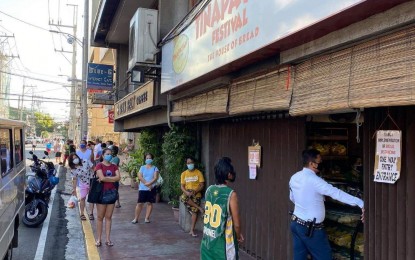
QUEUEING FOR FRESH BREAD. Patrons of this bakery along Dapitan Street in Manila practice social distancing as they wait in line for their turn to buy freshly baked bread. Community bakers in Metro Manila have reported brisk sales during the lockdown as consumers buy food from sources closer to home. (Photo courtesy of Elclaro Chavez)
MANILA -- The government-imposed enhanced community quarantine, which has for the past month kept tens of millions of Filipinos indoors and also stymied many business operations, has brought an unexpected windfall to many small bakeries in the metropolis.
The Asosasyon ng Pilipinong Panadero (APP), an organization of community bakers based mostly in Metro Manila, said its members are reaping an average sales increase of about 30 percent due to conditions created by the lockdown.
APP spokesperson Elclaro Chavez told the Philippine News Agency (PNA) that this is partly due to a general increase in the demand for bread, which is often handed out as an aid to those whose livelihoods have ground to a halt because of the order to stay indoors.
“Big industrial bakeries were also hit by a raw material supply disruption and sudden unavailability of workers early in the lockdown,” Chavez said in Filipino.
He said the production facilities of industrial bakeries are often located far apart from the suppliers of their raw materials. Moreover, many of their employees live in faraway towns and cities.
Bringing all the production inputs together in a metropolis, where the movement of people is tightly controlled, has been an almost insurmountable challenge for these big companies, Chavez added.
“The situation for them (industrial bakeries) seems to have improved in recent days. Their production operations seem back on track,” he said.
However, industrial bakeries often distribute their products through large supermarkets and grocery store chains, which have become less accessible to consumers during the quarantine, Chavez said.
On the other hand, community bakeries are often located within the neighborhood, within walking distance to consumers, while their workers are often “stay-in”, so commuting to work is often not an issue.
Chavez also noted that suppliers of raw materials in the modest volumes required by small bakeries are still able to service their needs as of now.
He, however, said there are indications that the supply of sugar and food-grade packaging materials may become a concern in the coming days due to the recent demand surge.
Chavez said the bakery sector is appealing to concerned government agencies to facilitate the hassle-free passage through police and military checkpoints of raw materials needed in the production of bread and related products.
“So long as our raw materials can get through, our members can assure consumers in their areas of a steady supply of bread at stable prices despite the extension of the quarantine,” he said.
Meanwhile, sari-sari store (small retailers of dry goods) proprietors are unlikely to cheer any spike in sales, like their baker counterparts.
Philippine Amalgamated Supermarkets Association (PAGASA) president Steve Cua said the Department of Trade and Industry (DTI) recently issued an order to supermarkets and other wholesalers, instructing them to stop selling goods to the sari-sari store industry at wholesale prices.
“This is supposed to prevent sari-sari stores from snapping up all the goods to the detriment of the consuming public. The DTI is really trying to prevent hoarding or creating artificial shortages. They (sari-sari store owners) can still buy from us but they will have to pay retail, just like everybody else," he said. (PNA)
